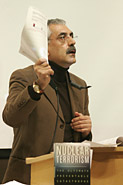Student group talks nukes
On the evening of January 27, the McGill chapter of the Student World Assembly (SWA) held its first major event. The SWA, like the model UN, addresses international isses — such as HIV and AIDs, Darfur, and nuclear arms. But in this case chapters everywhere from Ghana, to China, to Canada work to develop consensus on issues — independent of the stance of their respective governments.

Professor of International Politics M. Reza Fakhari, LaGuardia Community College and Fordham University
Owen Egan
Back in 1959, founder Paul Raynault was a math student at McGill, wondering why there was no international body representing the interests of individuals. "I thought it would be important to have a parallel organization that represented people in the way that the UN represents countries."
A masters degree in math from Princeton and award-winning work at IBM was followed by success as an entrepreneur. Finally, by the late 1990s, with the widening scope and lowering costs of communications, he realized that the essentials of an international group were within reach. Raynault took his idea to Poly Tech University in California when a friend invited him to speak to his class and encouraged him to direct his organization towards students. Sure enough, the idea caught on.
Now only a year and a half old, SWA includes 11 chapters at universities worldwide. Members have come up with the slogan, "Educate, Participate, Take Action." The first two steps take place through their website, which includes a forum where members suggest topics for discussion for upcoming months. The third element involves other groups, like Amnesty Inter-national, and letter-writing campaigns or public demonstrations.
The subject of the McGill chapter's first panel discussion, "Nuclear Proliferation in the Middle East: Myth or Reality?" might seem charmingly retro to those who remember the threat of attack in the eighties.
Yet many in attendance at the SWA conference, which was chaired by Farhang Rajaee (Carleton University) and included presentations from Hooshag Hasanyarii (the Royal Military College in Kingston), M. Reza Fakhari (LaGuardia College and Fordham University in New York City) and McGill's political science professor James Devine, might argue that, given the destabilization of the Middle East, the world now faces a greater risk of nuclear war than ever before.
According to Fakhari, a professor of international politics, academic advisor to SWA, and an Iranian-American: "If the U.S. wants to deal with the nuclear weapons issue in Iran, it has to solve underlying political differences with Iran and overcome mistrust. The nukes are symptoms of a political conflict, not cause of it."
If the same issues that haunted generations of past students demand attention today, the face of student activism has changed dramatically. Don't expect an emphasis on spray-painted anti-nuke slogans or civil disobedience from these activists.
While the operative word in the twentieth century was protest, the key now is communication. Raynault, who attended the event, explains: "The SWA is interested in empowering its student members to educate themselves, participate in developing a consensus and then taking action to influence others. Last year they decided that the way to reduce the number of wars was not to lobby for government treaties but rather to educate people, especially younger students about the problems with using war to settle issues and the alternatives."
Raynault sees other differences in student life today. "Students in developed countries — North America and Western Europe especially — used to be very engaged in some form of global problems: the cold war and especially a nuclear war, population explosion and what it would do to life in advanced countries. However their perspective and range of action was limited to the advanced countries.
"Students today just assume that they can include students everywhere. I am amazed at how much they take it for granted. Today students collect signatures for petitions from students around the globe, they email and interact globally."
Alireza Hajihosseini, a second-year student in Middle East studies and one of McGill SWA's founding members, describes his generation as one with multiple leadership opportunities. "A lot of our [SWA] members have had leadership and peer education experience." Before joining SWA, Hajihosseini himself was involved with Global Kids, an NGO focused on peer education and global issues.
"We understand the challenges of the 21st century. We understand the power of the Internet as a tool for connecting different people in different countries," he said.
"We want the world to respect the opinions of students and what they do."
Internationally, SWA members are going to need a lot of the determination Hajihosseini describes. Many students — representatives from Singapore, Ghana, Nigeria, and Nepal, as well as Afghanistan — were denied visas for the SWA conference in California last summer. It is hoped that, when the next conference for SWA chapters is held at McGill next fall, there will be fewer such complications.
Raynault's goal of representing individual interests un-mediated by national rhetoric is one step closer to being fulfilled: The SWA's latest coup is an invitation to attend a model UN in New York City next month.
"This is a great idea and great opportunity," Hajihosseini concludes.
For more information, see www.studentworldassembly.org or get in touch with mcgill@studentworkassembly.org.
